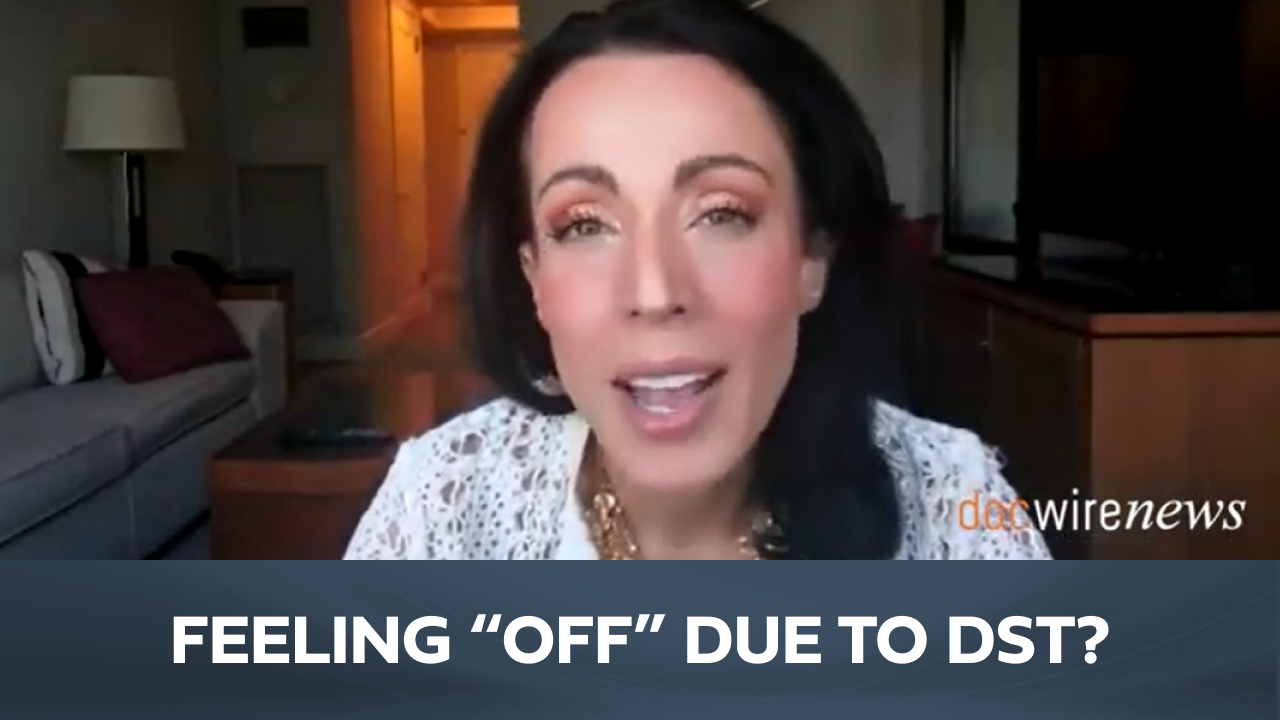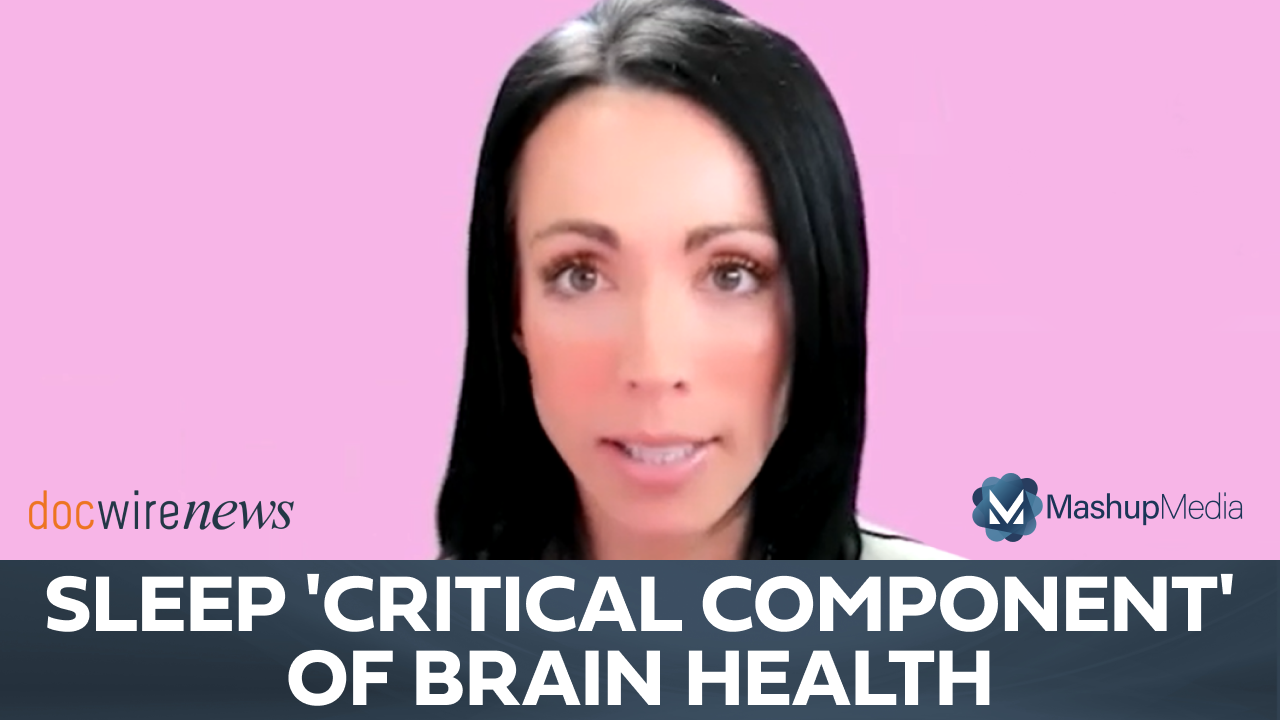Dr. Anne Marie Morse on the Link Between Sleep Disorders, Cancer
By Anne Marie Morse, DO, Rob Dillard - Last Updated: July 17, 2024As many as half of cancer patients have sleep problems, according to the National Cancer Institute. While it is known that having cancer is associated with sleep disturbances, Dr. Anne Marie Morse spoke with DocWire News about the lesser-known link between cancer and sleep and circadian science. She explains why having a dysfunctional circadian rhythm can lead to a higher risk of all-cause mortality and offers tips for health care providers treating patients with cancer who are impacted by sleep disorders.
Is there a correlation between sleep disorders and developing cancer? If so, why?
The relationship between any oncologic process and sleep is a really fascinating one, because when you talk to most people about this topic, there’s this reflexive thought of, well, of course patients who have cancer are sleepy. They’re getting chemotherapy! Many times, the knee-jerk reaction is to boil down the relationship to purely thinking about the quality of life after someone’s diagnosed.
The interesting thing, when talking about cancer, is the relationship between cancer and sleep and circadian science. It can’t be ignored. In fact, in 2007, the World Health Organization said that shift work is a likely carcinogen. Being a shift worker is going to increase your odds of cancer. This assertion has been further verified by the most recent publication in January 2024 looking at the UK Biobank’s actigraphy data, which included more than 1 million data points, and examining the survival curves, the all-cause mortality, for different types of circadian patterns.
I’m going to tell you that the more dysfunctional your circadian rhythm is, the higher the likelihood that you are going to die from something, including cancer. Now, with that stated, we have for years perpetuated the idea that duration of sleep was the only thing that mattered. If you get less than 6 or more than 9 hours of sleep, you’re going to increase your all-cause mortality. However, if you put duration versus regularity of sleep side by side, duration walks away with its tail between its legs.
The reason is because regularity of sleep is demonstrating even more impactful consequence in regard to the likelihood of experiencing and dying from things like cardiovascular disease and cancer. Why might that be? Ongoing data demonstrate that circadian science plays a tremendous role for every single organ system in our body. When looking at the 2017 Nobel Prize for the 3 men who discovered and characterized the molecular process of clock genes, what we’ve identified is that there is a DNA signature that tells our body this is how and when it should be working. Therefore, there is a peak time of function for every single cellular function in our body.
Do you know what else there is? There is a circadian expression for every single disease process we experience. So, when we start functioning outside of what our bodies have been designed to do, we are going to experience consequence. The same as if you’re driving around and you have something wrong with your tires, you’re going to see that your axles aren’t going to like it, and you may end up with a broken one. The reality is, don’t break your axles. Make sure you are maintaining a circadian alignment.
I can share some real-life examples of how we see this in clinical practice. Let’s start with breast cancer. For years, we’ve demonstrated that when you have circadian dysfunction in a woman, you identify that that woman is going to be more likely to have a more invasive, aggressive form of breast cancer that is less responsive to chemotherapy. There are machine learning models that are looking at this, that are demonstrating that is likely because there are actually regularities in some of the clock genes that may be driving some of this dysfunction.
What about the timing and administration of immunotherapies such as immune checkpoint inhibitors? What has been found, just this year, 2024, is that giving an immune checkpoint inhibitor in the morning is associated with better tolerability and outcomes. Not by accident, by design. This is based on retrospective analysis of over a dozen different studies demonstrating that timing matters.
Another example? 5-fluorouracil. If you have a genetic abnormality in DPYD, which is a gene that does play a role in terms of circadian expression, what we have found is that we need to make sure that we are paying attention to not only the timing but the dosing that we’re giving. Why? Because you’re going to end up toxic, and you’re not going to be able to tolerate the treatment. Therefore, this is clearly demonstrating that sleep and circadian science matters. It’s not a nicety in the quality of life, and although we should not be neglecting those, what we are recognizing is that by acknowledging sleep and circadian science as a part of management and diagnostics in oncology, we may actually be applying life-saving therapies that can be utilized by more people and maybe even prevent poor outcomes for even more.
What should physicians be cognizant of when treating patients with cancer suffering from sleep disorders?
As we look forward to what is the potential clinical impact of sleep and circadian science in oncology practice, there are several things that we need to think about. First and foremost, if you want to come from a patient-directed or patient-centered lens, we do need to acknowledge what is quality of life. We recognize that things like fatigue and sleepiness are very common in someone who is on their cancer journey and receiving treatments. We also see this in someone who is a survivor of cancer. That may be something that is more protracted and present and may greatly impair the quality of life and even contribute to the experience of accumulating burden from other disease processes.
Make sure you get a baseline, as well as follow-up sleep evaluations, maybe just starting with clinical interviews, sleep diaries, potentially actigraphy, and, if needed, polysomnography. The second piece is better examination of what is the role of different types of sleep disorders in not only the development of cancer, but also the relevance to the treatment of the cancers.
We recognize that when you do have a sleep disorder, it may potentially increase your risk of more aggressive and invasive cancer. So, it is not just a nicety of improving quality of life, but also may have significance in regard to the effectiveness of the therapies you’re providing to treat and cure those cancers. Finally, the area that I think is going to be most exciting is really understanding the circadian science related to the oncologic therapies that are available in the oncology experience itself.
We are recognizing that this is something that may be highlighted by how someone experiences their circadian rhythm. Do they have features of their circadian rhythm disorder, and is that an early enough of a sign or a feature that may give some credence to who needs to be screened or where we need to screen them? It is also important for us to be thinking about these things as we move forward when we’re analyzing pivotal trials of FDA-approved chemotherapeutic agents or other therapies that may help in the cancer process.
Do we see differences in performance based on the timing and administration of medications or potentially the timing of someone’s sleep-wake cycle? This is an area that I think is still very new and exciting, but one that probably is going to prove to be the most impactful not only prevention, but successful therapeutic intervention.







 © 2025 Mashup Media, LLC, a Formedics Property. All Rights Reserved.
© 2025 Mashup Media, LLC, a Formedics Property. All Rights Reserved.